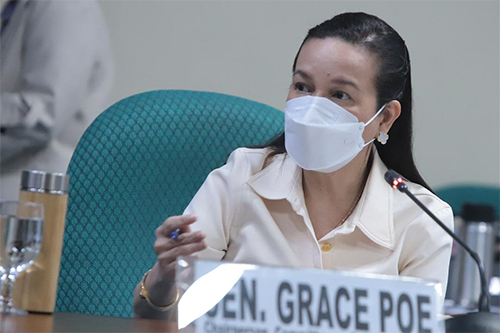Sen. Grace Poe has urged the Department of Information and Communications Technology (DICT) and local telcos to pull out all the stops to make the public register their SIM numbers on or before the April 26, 2023 deadline.

Photo from Senate
As of March 11, the latest statistics released by the country’s major telcos Smart Communications, Globe Telecom, and Dito Telecommunity Corp., a total of 43,669,429 subscribers registered in their systems, which is just 25.84% of the 168,977,773 million subscribers nationwide.
Smart reported a total of 22,337,207 SIMs registered, which is 32.85% of Smart’s 67,995,734 subscribers. Globe recorded 18,030,042 registered — 20.52% of its 87,873,936 subscribers.
Meanwhile, Dito Telecommunity reported a total of 3,302,180 SIMs registered or 25.19% of its 13,108,103 subscribers.
Republic Act No. 11934 requires all existing subscribers to enlist their mobile numbers with their service network.
When all SIMs have been registered, the government can now easily track digital fraud and make wrongdoers accountable, according to Poe.
The DICT may decide to extend the period of enlistment for 120 days more. Unregistered SIM cards would be deactivated.
Poe said that while the law allows for an extension, this should be used to further step up the SIM registration campaign.
“With the law, we expect all fraudulent and unwanted text messages to die a natural death. But we must not let our guard down,” Poe said.
“The extension period, if so decided by the DICT, will be for the legitimate subscribers to register and avoid disruption in their mobile phone services. This should not extend the heydays of the scammers,” Poe added.
Meanwhile, Sen. Sherwin Gatchalian has flagged the high cost of Internet access in the country, emphasizing the cost of Internet connectivity should be made more affordable for the benefit of consumers.
Speaking at a forum organized by the Senate Committee on Public Services, themed “Increasing Digital Connectivity in the Philippines”, Gatchalian revealed that in terms of Internet affordability, the average monthly cost of Internet services with at least 60 megabits per second (Mbps) average speed in the Philippines is about P2,057, based on estimates made by the crowd-sourced global database Numbeo.
By comparison, such an amount is about five percent higher when compared to the monthly cost of around P1,951 in Singapore, the country with the fastest average speed of 234.6 Mbps in terms of fixed broadband connection.
“These figures speak for themselves. We need to upgrade the quality of our Internet services. We need to ensure that the amount we’re paying for Internet services is commensurate to the quality that we’re receiving. Filipino citizens pay more than Singaporeans for Internet service,” Gatchalian stressed.
According to him, addressing the affordability issue of Internet services is just as important as the quality of broadband connectivity as lower cost of Internet will enhance inclusivity and level the playing field in various sectors.
“Compared to other Asean countries, the Philippines lags in terms of mobile Internet speed, with average downloads clocking in at just 24.6 Mbps and this is about 3.64 times slower than Brunei, which has the fastest reported connection in the Asean region,” bewailed Gatchalian.
“Higher connectivity to the Internet is a powerful catalyst for job creation. It also enables access to critical public services like education and healthcare,” he said.
In a bid to increase public access to the Internet, Congress enacted into law the “Free Internet Access in Public Places Act” to provide free Internet access in government offices and public places.
However, based on the “Digital 2023” report, Internet adoption in the Philippines stands at only 73.1%. This means that only about 80 million Filipinos use the Internet.
“If we could solve the issues we have with digital connectivity, we can be assured of universal, affordable, and reliable Internet connectivity which is a key component for inclusive economic recovery,” he concluded.




